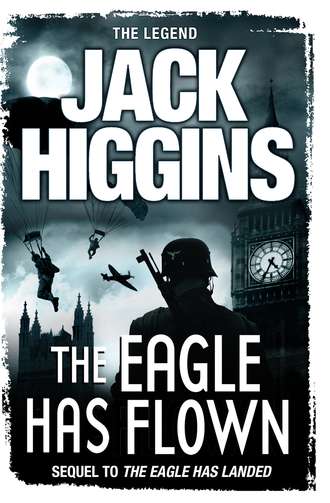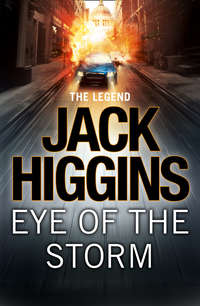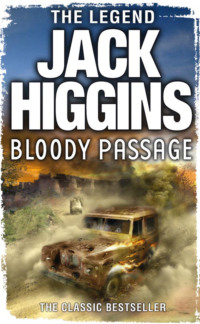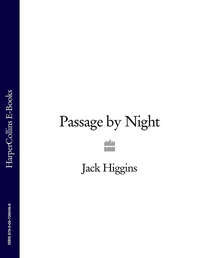
Полная версия
The Eagle Has Flown
Just after six, with darkness falling, I decided to go down to the bar for a drink, was pulling on my jacket when the phone went. A voice said, ‘Mr Higgins? Reception here, sir. Your taxi’s waiting.’
It was a black cab, the London variety, and the driver was a middle-aged woman, a pleasant-faced lady who looked like your favourite aunty. I pulled back the glass panel between us and gave her the ritual Belfast greeting.
‘Good night to you.’
‘And you.’
‘Not often I see a lady cab driver, not in London anyway.’
‘A terrible place that. What would you expect? You sit quiet now like a good gentleman and enjoy the trip.’
She closed the panel with one hand. The journey took no more than ten minutes. We passed along the Falls Road, a Catholic area I remembered well from boyhood and turned into a warren of mean side streets, finally stopping outside a church. She opened the glass panel.
‘The first confessional box on the right as you go in.’
‘If you say so.’
I got out and she drove away instantly. The board said ‘Church of the Holy Name’ and it was in surprisingly good condition, the times of Mass and confession listed in gold paint. I opened the door at the top of the steps and went in. It was not too large and dimly lit, candles flickering down at the altar, the Virgin in a chapel to one side. Instinctively, I dipped my fingers in the holy water and crossed myself, remembering the Catholic aunt in South Armagh who’d raised me for a while as a child and had anguished over my black little Protestant soul.
The confessional boxes stood to one side. No one waited, which was hardly surprising, for according to the board outside I was an hour early. I went in the first on the right and closed the door. I sat there in the darkness for a moment and then the grill slid open.
‘Yes?’ a voice asked softly.
I answered automatically. ‘Bless me, Father, for I have sinned.’
‘You certainly have, my old son.’ The light was switched on in the other box and Liam Devlin smiled through at me.
He looked remarkably well. In fact, rather better than he’d seemed the last time I’d seen him. Sixty-seven, but as I’d said to Ruth Cohen, lively with it. A small man with enormous vitality, hair as black as ever, and vivid blue eyes. There was the scar of an old bullet wound on the left side of his forehead and a slight, ironic smile was permanently in place. He wore a priest’s cassock and clerical collar and seemed perfectly at home in the sacristy at the back of the church to which he’d taken me.
‘You’re looking well, son. All that success and money.’ He grinned. ‘We’ll drink to it. There’s a bottle here surely.’
He opened a cupboard and found a bottle of Bushmills and two glasses. ‘And what would the usual occupant think of all this?’ I asked.
‘Father Murphy?’ He splashed whiskey into the glasses. ‘Heart of corn, that one. Out doing good, as usual.’
‘He looks the other way, then?’
‘Something like that.’ He raised his glass. ‘To you, my old son.’
‘And you, Liam.’ I toasted him back. ‘You never cease to amaze me. On the British Army’s most wanted list for the last five years and you still have the nerve to sit here in the middle of Belfast.’
‘Ah, well, a man has to have some fun.’ He took a cigarette from a silver case and offered me one. ‘Anyway, to what do I owe the pleasure of this visit?’
‘Does the name Dougal Munro mean anything to you?’
His eyes widened in astonishment. ‘What in the hell have you come up with now? I haven’t heard that old bastard’s name mentioned in years.’
‘Or Schellenberg?’
‘Walter Schellenberg? There was a man for you. General at thirty. Schellenberg – Munro? What is this?’
‘And Kurt Steiner?’ I said, ‘Who, according to everyone, including you, died trying to shoot the fake Churchill on the terrace at Meltham House.’
Devlin swallowed some of his whiskey and smiled amiably. ‘I was always the terrible liar. Now tell me what is this all about?’
So, I told him about Ruth Cohen, the file and its contents, everything, and he listened intently without interrupting.
When I was finished, he said, ‘Convenient, the girl’s death, you were right about that.’
‘Which doesn’t look too good for me.’
There was an explosion not too far away and as he got up and opened the door to the rear yard, the rattle of small arms fire.
‘It sounds like a lively night,’ I said.
‘Oh, it will be. Safer off the streets at the moment.’
He closed the door and turned to face me. I said, ‘The facts in that file. Were they true?’
‘A good story.’
‘In outline.’
‘Which means you’d like to hear the rest?’
‘I need to hear it.’
‘Why not.’ He smiled, sat down at the table again and reached for the Bushmills. ‘Sure and it’ll keep me out of mischief for a while. Now, where would you like me to begin?’
2
Brigadier Dougal Munro’s flat in Haston Place was only ten minutes’ walk from the London headquarters of SOE in Baker Street. As head of Section D, he needed to be on call twenty-four hours a day and besides the normal phone had a secure line routed directly to his office. It was that particular phone he answered on that late November evening as he sat by the fire working on some files.
‘Carter here, Brigadier. Just back from Norfolk.’
‘Good,’ Munro told him. ‘Call in on your way home and tell me about it.’
He put the phone down and went and got himself a malt whisky, a squat, powerful-looking man with white hair who wore steel-rimmed spectacles. Strictly a non-professional, his rank of brigadier was simply for purposes of authority in certain quarters and at sixty-five, an age when most men faced retirement, even at Oxford, the war had been the saving of him, that was the blunt truth. He was thinking about that when the doorbell rang and he admitted Captain Jack Carter.
‘You look frozen, Jack. Help yourself to a drink.’
Jack Carter leaned his walking stick against a chair and shrugged off his greatcoat. He was in the uniform of a captain in the Green Howards, the ribbon of the Military Cross on his battledress. His false leg was a legacy of Dunkirk and he limped noticeably as he went to the drinks cupboard and poured a whisky.
‘So, what’s the situation at Studley Constable?’ Munro asked.
‘Back to normal, sir. All the German paratroopers buried in a common grave in the churchyard.’
‘No marker of course?’
‘Not at the moment, but they’re a funny lot, those villagers. They actually seem to think quite highly of Steiner.’
‘Yes, well, one of his sergeants was killed saving the lives of two village children who fell into the mill race, remember. In fact, that single action was the one thing that blew their cover, caused the failure of the entire operation.’
‘And he did let the villagers go before the worst of the fighting started,’ Carter said.
‘Exactly. Have you got the file on him?’
Carter got his briefcase and extracted a couple of sheets stapled together. Munro examined it. ‘Oberstleutnant Kurt Steiner, age twenty-seven. Remarkable record. Crete, North Africa, Stalingrad. Knight’s Cross with Oak Leaves.’
‘I’m always intrigued by his mother, sir. Boston socialite. What they call “Boston Brahmin”.’
‘All very fine, Jack, but don’t forget his father was a German general and a damn good one. Now, what about Steiner? How is he?’
‘There seems no reason to doubt a complete recovery. There’s an RAF hospital for bomber crews with burns problems just outside Norwich. Rather small. Used to be a nursing home. We have Steiner there under secure guard. The cover story is that he’s a downed Luftwaffe pilot. Rather convenient that German paratroopers and Luftwaffe aircrews wear roughly the same uniform.’
‘And his wounds?’
‘He was damn lucky there, sir. One round hit him in the right shoulder, at the rear. The second was a heart shot, but it turned on the breastbone. The surgeon doesn’t think it will take long, especially as he’s in remarkable physical shape.’
Munro went and got another small whisky. ‘Let’s go over what we know, Jack. The whole business, the plot to kidnap Churchill, the planning. Everything was done without Admiral Canaris’s knowledge?’
‘Apparently so, sir, all Himmler’s doing. He pressured Max Radl at Abwehr headquarters to plan it all behind the Admiral’s back. At least that’s what our sources in Berlin tell us.’
‘He knows all about it now, though?’ Munro said. ‘The Admiral I mean?’
‘Apparently, sir, and not best pleased, not that there’s anything he can do about it. Can’t exactly go running to the Führer.’
‘And neither can Himmler,’ Munro said. ‘Not when the whole project was mounted without the Führer’s knowledge.’
‘Of course Himmler did give Max Radl a letter of authorization signed by Hitler himself,’ Carter said.
‘Purporting to be signed by Hitler, Jack. I bet that was the first thing to go into the fire. No, Himmler won’t want to advertise this one.’
‘And we don’t exactly want it on the front of the Daily Express, sir. German paratroopers trying to grab the Prime Minister, battling it out with American Rangers in an English country village?’
‘Yes, it wouldn’t exactly help the war effort.’ Munro looked at the file again. ‘This IRA chap, Devlin. Quite a character. You say that your information is that he was wounded?’
‘That’s right, sir. He was in hospital in Holland and simply took off one night. We understand he’s in Lisbon.’
‘Probably hoping to make it to the States in some way. Are we keeping an eye on him? Who’s the SOE’s man in Lisbon?’
‘Major Arthur Frear, sir. Military attaché at the Embassy. He’s been notified,’ Carter told him.
‘Good.’ Munro nodded.
‘So what do we do about Steiner, sir?’
Munro frowned, thinking about it. ‘The moment he’s fit enough, bring him up to London. Do we still house German prisoners of war in the Tower?’
‘Only occasionally, sir, transients passing through the small hospital. Not like the early days of the war when most of the captured U-boat people were housed there.’
‘And Hess.’
‘A special case, sir?’
‘All right. We’ll have Steiner at the Tower. He can stay in the hospital till we decide on a safe house. Anything else?’
‘One development, sir. Steiner’s father was involved, as you know, in a series of army plots aimed at assassinating Hitler. The punishment is statutory. Hanging by piano wire and by the Führer’s orders the whole thing is recorded on film.’
‘How unpleasant,’ Munro said.
‘The thing is, sir, we’ve received a film of General Steiner’s death. One of our Berlin sources got it out via Sweden. I don’t know if you’ll want to see it. It’s not very nice.’
Munro was angry, got up and paced the room. He paused suddenly, a slight smile on his mouth. ‘Tell me, Jack, is that little toad Vargas still at the Spanish Embassy?’
‘José Vargas, sir, trade attaché. We haven’t used him in a while.’
‘But German Intelligence are convinced he’s on their side?’
‘The only side Vargas is on is the one with the biggest bank book, sir. Works through his cousin at the Spanish Embassy in Berlin.’
‘Excellent.’ Munro was smiling now. ‘Tell him to pass the word to Berlin that we have Kurt Steiner. Tell him to say in the Tower of London. Sounds very dramatic. Most important, he makes sure that both Canaris and Himmler get the information. That should get them stirred up.’
‘What on earth are you playing at, sir?’ Carter asked.
‘War, Jack, war. Now have another drink, then get yourself off home to bed. You’re going to have a full day tomorrow.’
Near Paderborn in Westphalia in the small town of Wewelsburg was the castle of that name which Heinrich Himmler had taken over from the local council in 1934. His original intention had been to convert it into a school for Reich SS leaders, but by the time the architects and builders had finished and many millions of marks had been spent, he had created a Gothic monstrosity worthy of stage six at MGM, a vast film set of the kind Hollywood was fond of when historical pictures were the vogue. The castle had three wings, towers, a moat and in the southern wing the Reichsführer had his own apartments and his especial pride, the enormous dining hall where selected members of the SS would meet in a kind of Court of Honour. The whole thing had been influenced by Himmler’s obsession with King Arthur and the Knights of the Round Table, with a liberal dose of occultism thrown in.
Ten miles away on that December evening, Walter Schellenberg lit a cigarette in the back of the Mercedes which was speeding him towards the castle. He’d received the order to meet the Reichsführer in Berlin that afternoon. The reason had not been specified. He certainly didn’t take it as any evidence of preferment.
He’d been to Wewelsburg on several occasions, had even inspected the castle’s plans at SD headquarters, so knew it well. He also knew that the only men to sit round that table with the Reichsführer were cranks like Himmler himself who believed all the dark-age twaddle about Saxon superiority, or time-servers who had their own chairs with names inscribed on a silver plate. The fact that King Arthur had been Romano-British and engaged in a struggle against Saxon invaders made the whole thing even more nonsensical, but Schellenberg had long since ceased to be amused by the excesses of the Third Reich.
In deference to the demands of Wewelsburg, he wore the black dress uniform of the SS, the Iron Cross First Class pinned to the left side of his tunic.
‘What a world we live in,’ he said softly as the car took the road up to the castle, snow falling gently. ‘I sometimes really do wonder who is running the lunatic asylum.’
He smiled as he sat back, looking suddenly quite charming although the duelling scar on one cheek hinted at a more ruthless side to his nature. It was a relic of student days at the University of Bonn. In spite of a gift for languages, he’d started in the Faculty of Medicine, had then switched to law. But in Germany in 1933 times were hard, even for well-qualified young men just out of university.
The SS were recruiting gifted young scholars for their upper echelons. Like many others, Schellenberg had seen it as employment, not as a political ideal, and his rise had been astonishing. Because of his language ability, Heydrich himself had pulled him into the Sicherheitsdienst, the SS security service, known as the SD. His main responsibility had always been intelligence work, abroad, often a conflict with the Abwehr, although his personal relationship with Canaris was excellent. A series of brilliant intelligence coups had pushed him up the ladder rapidly. By the age of thirty, he was an SS Brigadeführer and Major General of Police.
The really astonishing thing was that Walter Schellenberg didn’t consider himself a Nazi, looked on the Third Reich as a sorry charade, its main protagonists actors of a very low order indeed. There were Jews who owed their survival to him, intended victims of the concentration camps rerouted to Sweden and safety. A dangerous game, a sop to his conscience, he told himself, and he had his enemies. He had survived for one reason only. Himmler needed his brains and his considerable talents and that was enough.
There was only a powdering of snow in the moat, no water. As the Mercedes crossed the bridge to the gate, he leaned back and said softly, ‘Too late to get off the roundabout now, Walter, far too late.’
Himmler received him in his private sitting room in the south wing. Schellenberg was escorted there by an SS sergeant in dress uniform and found Himmler’s personal aide, a Sturmbannführer named Rossman, sitting at a table outside the door, also in dress uniform.
‘Major.’ Schellenberg nodded.
Rossman dismissed the sergeant. ‘A pleasure to see you, General. He’s waiting. The mood isn’t good, by the way.’
‘I’ll remember that.’
Rossman opened the door and Schellenberg entered a large room with a vaulted ceiling and flagged floor. There were tapestries on the walls and lots of dark oak furniture. A log fire burned on a great stone hearth. The Reichsführer sat at an oak table working his way through a mound of papers. He was not in uniform, unusual for him, wore a tweed suit, white shirt and black tie. The silver pince-nez gave him the air of a rather unpleasant schoolmaster.
Unlike Heydrich who had always addressed Schellenberg by his Christian name, Himmler was invariably formal. ‘General Schellenberg.’ He looked up. ‘You got here.’
There was an implied rebuke and Schellenberg said, ‘I left Berlin the moment I received your message, Reichsführer. In what way can I serve you?’
‘Operation Eagle, the Churchill affair. I didn’t employ you on that business because you had other duties. However, by now you will be familiar with most of the details.’
‘Of course, Reichsführer.’
Himmler abruptly changed the subject. ‘Schellenberg, I am increasingly concerned at the treasonable activities of many members of the High Command. As you know, some wretched young major was blown up in his car outside the entrance to the Führer’s headquarters at Rastenburg last week. Obviously another attempt on our Führer’s life.’
‘I’m afraid so, Reichsführer.’
Himmler stood up and put a hand on his shoulder. ‘You and I, General, are bound by a common brotherhood, the SS. We are sworn to protect the Führer and yet are constantly threatened by this conspiracy of generals.’
‘There is no direct proof, Reichsführer,’ Schellenberg said, which was not strictly true.
Himmler said, ‘General von Stulpnagel, von Falk-enhausen, Stief, Wagner and others, even your good friend Admiral Wilhelm Canaris, Schellenberg. Would that surprise you?’
Schellenberg tried to stay calm, envisaging the distinct possibility that he might be named next. ‘What can I say, Reichsführer?’
‘And Rommel, General, the Desert Fox himself. The people’s hero.’
‘My God!’ Schellenberg gasped, mainly because it seemed the right thing to do.
‘Proof.’ Himmler snorted. ‘I’ll have my proof before I’m done. They have a date with the hangman, all of them. But to other things.’ He returned to the table and sat. ‘Have you ever had any dealings with an agent named Vargas?’ He examined a paper in front of him. ‘José Vargas.’
‘I know of him. An Abwehr contact. A commercial attaché at the Spanish Embassy in London. As far as I know, he has only been used occasionally.’
‘He has a cousin who is also a commercial attaché at the Spanish Embassy here in Berlin. One Juan Rivera.’ Himmler glanced up. ‘Am I right?’
‘So I understand, Reichsführer. Vargas would use the Spanish diplomatic bag from London. Most messages would reach his cousin here in Berlin within thirty-six hours. Highly illegal, of course.’
‘And thank God for it,’ Himmler said. ‘This Operation Eagle affair. You say you are familiar with the details?’
‘I am, Reichsführer,’ Schellenberg said smoothly.
‘There is a problem here, General. Although the idea was suggested by the Führer, it was, how shall I put it, more a flight of fancy than anything else? One couldn’t rely on Canaris to do anything about it. I’m afraid that total victory for the Third Reich is low on his list of priorities. That is why I personally put the plan into operation, aided by Colonel Radl of the Abwehr, who’s had a heart attack, I understand, and is not expected to live.’
Schellenberg said cautiously, ‘So the Führer knows nothing of the affair?’
‘My dear Schellenberg, he carries the responsibility for the war, its every aspect, on his own shoulders. It is our duty to lighten that load as much as possible.’
‘Of course, Reichsführer.’
‘Operation Eagle, however brilliantly conceived, ended in failure, and who would wish to take failure into the Führer’s office and place it on his desk?’ Before Schellenberg could reply, he carried on. ‘Which brings me to this report which has reached me from Vargas in London via his cousin here in Berlin, the man Rivera.’
He handed across a signal flimsy and Schellenberg glanced at it. ‘Incredible!’ he said. ‘Kurt Steiner alive.’
‘And in the Tower of London.’ Himmler took the signal back.
‘They won’t keep him there for very long,’ Schellenberg said. ‘It may sound dramatic, but the Tower isn’t really suitable to house high-security prisoners long term. They’ll move him to some safe house just as they did with Hess.’
‘Have you any other opinion in the matter?’
‘Only that the British will keep quiet about the fact that he’s in their hands.’
‘Why do you say that?’
‘Operation Eagle almost succeeded.’
‘But Churchill wasn’t Churchill,’ Himmler reminded him. ‘Our Intelligence people discovered that.’
‘Of course, Reichsführer, but German paratroopers did land on English soil and fought a bloody battle. If the story was publicized, the effect on the British people at this stage of the war would be appalling. The very fact that it’s SOE and their Brigadier Munro who are handling the matter, is further proof.’
‘You know the man?’
‘Know of him only, Reichsführer. A highly capable intelligence officer.’
Himmler said, ‘My sources indicate that Rivera has also passed this news on to Canaris. How do you think he will react?’
‘I’ve no idea, Reichsführer.’
‘You can see him when you get back to Berlin. Find out. My opinion is that he will do nothing. He certainly won’t go running to the Führer.’ Himmler examined another sheet in front of him. ‘I’ll never understand men like Steiner. A war hero. Knight’s Cross with Oak Leaves, a brilliant soldier, and yet he ruined his career, risked failure, everything, for the sake of some little Jewish bitch he tried to help in Warsaw. It was only Operation Eagle that saved him and his men from the penal unit they were serving in.’ He put the sheet down. ‘The Irishman, of course, is a different matter.’
‘Devlin, Reichsführer?’
‘Yes, a thoroughly obnoxious man. You know what the Irish are like, Schellenberg? Everything a joke.’
‘I must say that from all reports he seems to know his business.’
‘I agree, but then he was only in it for the money. Someone was singularly careless to allow him to walk out of that hospital in Holland.’
‘I agree, Reichsführer.’
‘My reports indicate that he’s in Lisbon now,’ Himmler said. He pushed another sheet across. ‘You’ll find the details there. He’s trying to get to America, but no money. According to that, he’s been working as a barman.’
Schellenberg examined the signal quickly then said, ‘What would you like me to do on this matter, Reichsführer?’
‘You’ll return to Berlin tonight, fly to Lisbon tomorrow. Persuade this rogue Devlin to return with you. I shouldn’t think that would prove too difficult. Radl gave him twenty thousand pounds for taking part in Operation Eagle. It was paid into a numbered account in Geneva.’ Himmler smiled thinly. ‘He’ll do anything for money. He’s that sort. Offer him the same – more if you have to. I’ll authorize payments up to thirty thousand pounds.’
‘But for what, Reichsführer?’
‘Why, to arrange Steiner’s escape, of course. I should have thought that’s obvious. The man is a hero of the Reich, a true hero. We can’t leave him in British hands.’
Remembering how General Steiner had met his end in the Gestapo cellars at Prinz Albrechtstrasse, it seemed likely to Schellenberg that Himmler might have other reasons. He said calmly, ‘I take your point, Reichsführer.’
‘You know the confidence I repose in you, General,’ Himmler said. ‘And you’ve never let me down. I leave the whole matter in your capable hands.’ He passed an envelope across. ‘You’ll find a letter of authorization in there that should take care of all contingencies.’
Schellenberg didn’t open it. Instead he said, ‘You said you wanted me to go to Lisbon tomorrow, Reichsführer. May I remind you it’s Christmas Eve?’









